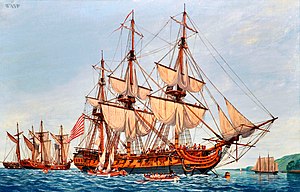USS Confederacy
This article includes a list of general references, but it lacks sufficient corresponding inline citations. (October 2011) |
 A Revolutionary War painting depicting the Continental Navy frigate Confederacy is displayed at the Navy Art Gallery at the Washington Navy Yard.
| |
| History | |
|---|---|
| Name | USS Confederacy |
| Builder | Norwich, Connecticut |
| Launched | 8 November 1778 |
| Fate | Captured 14 April 1781 |
| Name | Confederate |
| Fate | Broken up March 1782 |
| General characteristics | |
| Type | Frigate |
| Tons burthen | 959, or 970+86⁄94 (bm) |
| Length |
|
| Beam |
|
| Depth of hold |
|
| Complement | 260 officers and men |
| Armament | |
| Service record | |
| Commanders: |
|
USS Confederacy was a 36-gun sailing frigate of the Continental Navy in the American Revolutionary War. The British Royal Navy captured her in March 1781. The British named her Confederate but never commissioned her. She reached England in about half-a-year and was broken up in 1782.
Career
[edit]She was launched on 8 November 1778 at Chatham (Norwich), Connecticut, and towed to New London to be prepared for sea. From 1 May to 24 August 1779 she cruised on the Atlantic coast under the command of Captain Seth Harding. While convoying a fleet of merchantmen, on 6 June, she and Deane captured three prizes, drove off two British frigates and brought the convoy safely into Philadelphia, Pennsylvania.
On 17 September 1779 Confederacy was ordered to carry the French Minister and his family back to France. Later John Jay, the first American Minister to Spain, his secretary, and family were added to the passenger list. During the passage on 7 November 1779 Confederacy was completely dismasted and almost lost, but managed through the skillful seamanship of Captain Harding to reach Martinique early in December. After repairs, she returned to convoy duty.
Captain Nicholson replaced Harding in on 20 October 1780.
Confederacy was homeward bound from Cape Francois in the West Indies in 1781 with military stores and other supplies and escorting a fleet of 37 merchantmen, when on 14 April she encountered HMS Roebuck (44) and HMS Orpheus (32) off the Delaware Capes. The British ships forced Confederacy to strike her flag.[1] Most of the merchantmen she was escorting escaped. Many of her crew were sent to the old prison hulk Jersey, though some ended up in Mill and Forton prisons.
Fate
[edit]
The Royal Navy sent her to England, under the command of Captain James Cumming. He paid her off in September 1781. She was never commissioned and was docked on 18 November 1781 at Woolwich. She was broken up there in March 1782.[2]
See also
[edit]Citations
[edit]- ^ "No. 12427". The London Gazette. 29 March 1783. p. 2.
- ^ "NMM, vessel ID 382667" (PDF). Warship Histories, vol xii. National Maritime Museum. Archived from the original (PDF) on 2 August 2011. Retrieved 30 July 2011.
References
[edit] This article incorporates text from the public domain Dictionary of American Naval Fighting Ships. The entry can be found here.
This article incorporates text from the public domain Dictionary of American Naval Fighting Ships. The entry can be found here.- This article includes data released under a Creative Commons Attribution-ShareAlike 3.0 Unported UK: England & Wales Licence, by the National Maritime Museum, as part of the Warship Histories project.
External links
[edit]- The Frigate Confederacy Papers, including correspondence, bills, receipts and other materials pertaining to the construction of USS Confederacy, are available for research use at the Historical Society of Pennsylvania.
